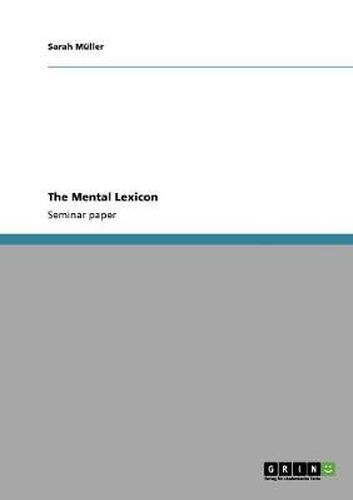Readings Newsletter
Become a Readings Member to make your shopping experience even easier.
Sign in or sign up for free!
You’re not far away from qualifying for FREE standard shipping within Australia
You’ve qualified for FREE standard shipping within Australia
The cart is loading…






Seminar paper from the year 2007 in the subject English Language and Literature Studies - Linguistics, grade: 2, University of Frankfurt (Main), 11 entries in the bibliography, language: English, abstract: Das mentale Lexikon wird in dieser Arbeit mit seinen verschiedenen Aspekten dargestellt. Unterschiedliche Theorieansatze werden vorgestellt, u. a. von Aitchison. 1. Introduction […] Aitchison (2003:6) refers to a study by Seashore and Eckerson (1940) in which they estimated that an educated adult knows more than 58,000 common ‘basic words’, 1,700 rare ‘basic words’ and 96,000 derivates and compounds. This is an overall total of 150,000 words of which 90% are used actively. Aitchison (2003:6-7) argues that this figure is controversial, because of the problems of defining ‘word’ and the difficulty of finding a reliable procedure for assessing vocabulary knowledge . Rothweiler (2001:21) refers to Miller (1993) who estimates the vocabulary of an average educated adult at 80,000 words. Rothweiler (2001:21) argues that the mental lexicon is more than a passive memory. She refers to Levelt (1989:181) that the lexicon is a central station between conceptualization on the one hand and the grammatical and phonological coding of language on the other hand. Both the acquisition of words and the usage of words refer to lexical processes. The lexicon seems to be well structured because words can be located in a split second (Aitchison 2003:7). Both Rothweiler and Aitchison refer to confirmed experiments that native speakers can recognize a word of their mother tongue in 200 ms or less from its onset and can reject a non-word sound sequence in about half a second. Production of a word is slightly slower: the lexicon is able to generate up to six syllables a second, making three or more words […] fairly standard (Aitchison 2003:8). Errors of selection are rare - one in about a thousand words. This paper is about the mental lexicon. First, I will compare the mental lex
$9.00 standard shipping within Australia
FREE standard shipping within Australia for orders over $100.00
Express & International shipping calculated at checkout
Stock availability can be subject to change without notice. We recommend calling the shop or contacting our online team to check availability of low stock items. Please see our Shopping Online page for more details.
Seminar paper from the year 2007 in the subject English Language and Literature Studies - Linguistics, grade: 2, University of Frankfurt (Main), 11 entries in the bibliography, language: English, abstract: Das mentale Lexikon wird in dieser Arbeit mit seinen verschiedenen Aspekten dargestellt. Unterschiedliche Theorieansatze werden vorgestellt, u. a. von Aitchison. 1. Introduction […] Aitchison (2003:6) refers to a study by Seashore and Eckerson (1940) in which they estimated that an educated adult knows more than 58,000 common ‘basic words’, 1,700 rare ‘basic words’ and 96,000 derivates and compounds. This is an overall total of 150,000 words of which 90% are used actively. Aitchison (2003:6-7) argues that this figure is controversial, because of the problems of defining ‘word’ and the difficulty of finding a reliable procedure for assessing vocabulary knowledge . Rothweiler (2001:21) refers to Miller (1993) who estimates the vocabulary of an average educated adult at 80,000 words. Rothweiler (2001:21) argues that the mental lexicon is more than a passive memory. She refers to Levelt (1989:181) that the lexicon is a central station between conceptualization on the one hand and the grammatical and phonological coding of language on the other hand. Both the acquisition of words and the usage of words refer to lexical processes. The lexicon seems to be well structured because words can be located in a split second (Aitchison 2003:7). Both Rothweiler and Aitchison refer to confirmed experiments that native speakers can recognize a word of their mother tongue in 200 ms or less from its onset and can reject a non-word sound sequence in about half a second. Production of a word is slightly slower: the lexicon is able to generate up to six syllables a second, making three or more words […] fairly standard (Aitchison 2003:8). Errors of selection are rare - one in about a thousand words. This paper is about the mental lexicon. First, I will compare the mental lex